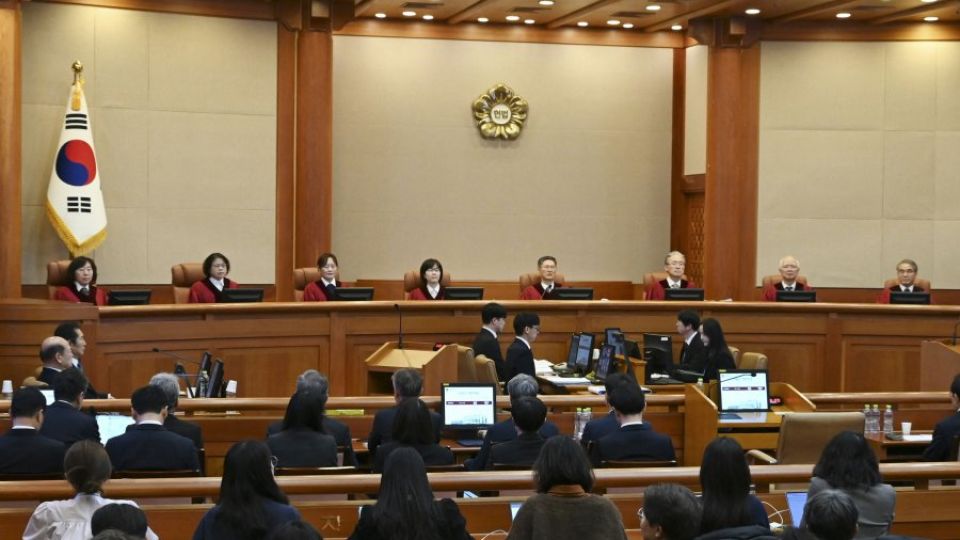February 28, 2025
SEOUL – The Constitutional Court on Thursday confirmed that acting President Choi Sang-mok has a duty to name a ninth judge to the court, and that failing to do so would constitute a violation of the legislature’s rights, in a ruling in favor of the National Assembly that impeached President Yoon Suk Yeol last December.
In a unanimous 8-0 ruling, the court found that the acting president’s refusal to appoint nominee Ma Eun-hyuk as the court’s ninth justice after selectively appointing two other judges nominated by the Assembly is a violation of the legislature’s rights. Parliament had nominated three judges to fill an equal number of vacancies on the nine-member bench late last year.
The court, however, rejected the National Assembly’s claim that the court can mandate the acting president to immediately name Ma as the ninth justice.
Acting President Choi, who doubles as deputy prime minister, has yet to appoint the ninth justice. However, if Choi does appoint Ma, a new debate could emerge over whether Ma is eligible to join the eight sitting justices in delivering the Constitutional Court’s verdict on President Yoon Suk Yeol’s impeachment. Since Ma did not participate in the pleadings, which concluded on Tuesday, his role in the ruling could be contested.
A government official said on condition of anonymity Thursday that Choi “respects the Constitutional Court ruling,” adding he would “pore over the court judgment” before making any decision.
National Assembly Speaker Rep. Woo Won-shik told reporters Thursday that acting President Choi “should swiftly complete the procedure to appoint Ma.”
Liberal main opposition Democratic Party of Korea’s floor leader Rep. Park Chan-dae echoed Woo, hailing the court decision as “reaffirming common sense,” while urging Choi to extend an apology for his “unconstitutional act.”
Ma, a left-leaning figure, is a senior judge at the Seoul Western District Court.
If approved by Choi, Ma would fill the last remaining vacancy on the Constitutional Court, which has been without a full bench since October. The court moves to issue a verdict in Yoon’s impeachment trial as early as March.
Yoon’s legal team, in a statement Thursday, condemned the Constitutional Court ruling, saying that the court had turned into sympathizers of the opposition party and abandoned its role as a mediator.
It also argued that the case contained procedural irregularities as it was filed by Woo alone, without the approval of the National Assembly. This contrasted with the view of the eight Constitutional Court justices Thursday that the procedure was unblemished because Woo gained parliamentary backing separately.
The conservative ruling People Power Party’s floor leader, Rep. Kweon Seong-dong, told reporters Thursday that Choi should not approve Ma’s appointment and that the court ruling does not compel the acting president to appoint him.
The ruling came almost two months after acting President Choi, on Jan. 1, appointed two of the three Constitutional Court justice candidates nominated by the National Assembly, with an opposition-led resolution calling for their approval having gained parliamentary approval on Dec. 26.
Earlier on Dec. 9, the National Assembly recommended Ma along with Chung Kye-sun, a left-leaning judge who was then head of the Seoul Western District Court; and right-leaning Cho Han-chang, who was then an attorney, as candidates to serve on the Constitutional Court. This followed Yoon’s imposition of martial law on Dec. 3.
But rival parties have been at odds over whether the parliament’s nomination in early December, following months of debate, was based on bipartisan compromise.
After Choi’s approval, Chung and Cho managed to fill the judicial vacancies of the Constitutional Court in January. Ma, however, has yet to be appointed.
National Assembly Speaker Woo filed the case with the Constitutional Court on Jan. 3. The hearings on competence disputes ended on Feb. 10.


